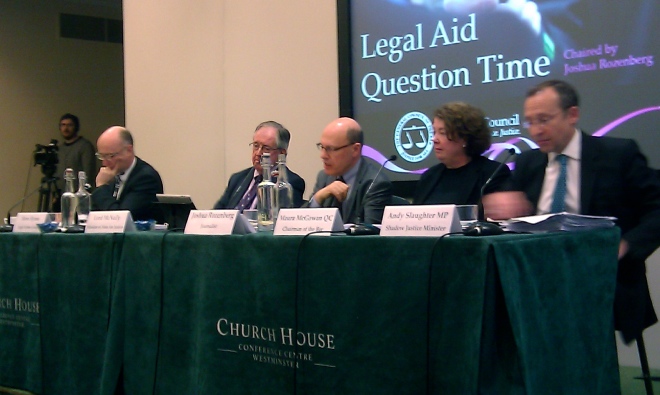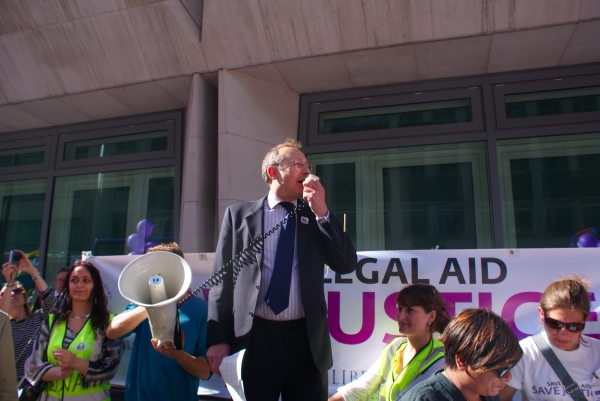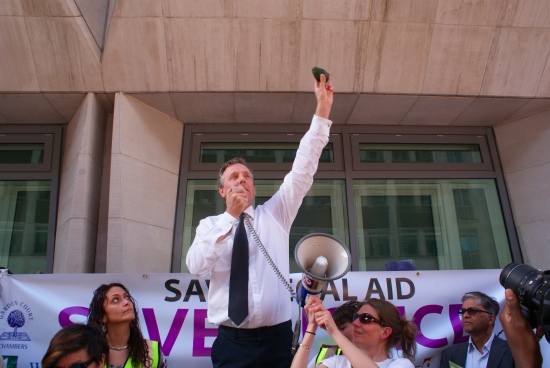Vinter, Bamber & Moore v UK: whole life prisoners must have the “experience of hope”
The European Court of Human Rights has ruled that the system of “whole life orders”, whereby in England and Wales a mandatory life sentence may be imposed and the possibility of early release denied under section 269(4) of the Criminal Justice Act 2003, amounts to inhuman or degrading treatment or punishment in breach of article 3 of the European Convention on Human Rights. Even prisoners given “whole life orders” – a recent example was Dale Cregan – must be able to have their sentence reviewed at some stage, for instance after 25 years. They must know when sentenced what they must do to gain release, and they must know when they can ask for a review.
The judgment does not ban whole life orders. Nor, strictly, does it introduce for the first time into our law the possibility of a review – the Court of Appeal has already ruled that there is a such a possibility. The judgment does not require that any “whole life” prisoner be released, ever. While there is certainly room to criticise the judgment, it is not an incursion on British domestic policy making on anything like the scale of the prisoners’ voting judgments (or for that matter the one on the DNA database, which for some reason English Conservatives seem unconcerned by). The judgment can be complied with without changing the law at least in the short term. Still, it’s bound to infuriate Eurosceptic opinion – and is already doing so.
The court’s reasoning is as follows.
A life sentence is inhuman or degrading in breach of Article 3, unless there is both some prospect of release and some possibility of review (see para. 110 of the judgment). This is because even if a whole life order is justified when made, continuing detention may become unjustified later (§111 of the judgment), because there’s a risk a prisoner may never atone for his offence and that his punishment may even increase as time goes on (§112) and because it would be incompatible with respect for human dignity to deprive a person of his freedom without at least providing him with the chance to someday regain it (§113). While punishment remains one of the aims of imprisonment, the emphasis in European penal policy is now on the rehabilitation, particularly towards the end of a long prison sentence (§115). Therefore (§119):
Article 3 must be interpreted as requiring reducibility of the sentence, in the sense of a review which allows the domestic authorities to consider whether any changes in the life prisoner are so significant, and such progress towards rehabilitation has been made in the course of the sentence, as to mean that continued detention can no longer be justified on legitimate penological grounds.
The court accepted (§120) that
it is not its task to prescribe the form (executive or judicial) which that review should take. For the same reason, it is not for the Court to determine when that review should take place.
but
This being said, the Court would also observe that the comparative and international law materials before it show clear support for the institution of a dedicated mechanism guaranteeing a review no later than twenty-five years after the imposition of a life sentence, with further periodic reviews thereafter …
Therefore (§121)
where domestic law does not provide for the possibility of such a review, a whole life sentence will not measure up to the standards of Article 3 of the Convention.
Interestingly the court goes beyond merely requiring the possibility of review at an unspecified time (§122):
Although the requisite review is a prospective event necessarily subsequent to the passing of the sentence, a whole life prisoner should not be obliged to wait and serve an indeterminate number of years of his sentence before he can raise the complaint that the legal conditions attaching to his sentence fail to comply with the requirements of Article 3 in this regard … A whole life prisoner is entitled to know, at the outset of his sentence, what he must do to be considered for release and under what conditions, including when a review of his sentence will take place or may be sought. Consequently, where domestic law does not provide any mechanism or possibility for review of a whole life sentence, the incompatibility with Article 3 on this ground already arises at the moment of the imposition of the whole life sentence and not at a later stage of incarceration.
The government argued (§94) that, as the Court of Appeal ruled in R v Bieber, there is the possibility of a review in English law since the Secretary of State’s power of release in section 30 of the Crime (Sentences) Act 1997 must, legally, be exercised compatibly with the Convention rights. So the applicants can argue that their continued detention is not justified, and a decision by the Secretary of State not to release them could be judicially reviewed. This is an important point, because it shows the government accepted, even before today’s judgment, that a prisoner like Jeremy Bamber could already ask to have his whole life order reviewed, and could already go to court to try to enforce a review. It’d be wrong for ministers now to suggest that this was a possibility unheard of before Strasbourg’s intervention today.
But for the Strasbourg judges, that wasn’t enough. The Bieber judgment is not reflected in he government’s written policy as set out in Prison Service Order 4700, the “indeterminate sentence manual” (§126). It’s this lack of clarity that the court saw as ultimately fatal to the UK’s case
In light, therefore, of this contrast between the broad wording of section 30 (as interpreted by the Court of Appeal in a Convention-compliant manner, as it is required to be as a matter of United Kingdom law in accordance with the Human Rights Act) and the exhaustive conditions announced in the Prison Service Order, as well as the absence of any dedicated review mechanism for the whole life orders, the Court is not persuaded that, at the present time, the applicants’ life sentences can be regarded as reducible for the purposes of Article 3 of the Convention. It accordingly finds that the requirements of Article 3 in this respect have not been met in relation to any of the three applicants.
I think there are a number of problems with the judgment. The court’s reasoning at paragraphs 111-119 seems to me thin and unsatisfactory. At paragraph 112, for instance, it does not consider the possibility that atonement may be impossible not because of any failure of the criminal justice system, but because of the nature of the offence itself. No reason is given to support the argument that a whole life sentence disrespects human dignity (except for an approving reference to a judgment of the German Constitutional Court).
And the court does not ask itself why, if detention under a whole life order may turn out to be unjustified one day, the point at which it does so shouldn’t be ten years, or fifteen, rather than the 25 it comes close to recommending. Wouldn’t a fixed review after 25 years be an equally inflexible rule, perhaps allowing inhuman detention after 20, 19 or 12 years in some cases? And what about prisoners sentenced to a whole life order at the age of, say, 65? Wouldn’t a fixed review after 25 years treat them less favourably than younger convicts? Generally, the way the court flirts with a 25 year rule at paragraph 120 seems to me to get close to laying down detailed policy for the whole of Europe, and going beyond the court’s proper role.
Leichtenstein’s Judge Villiger (he’s actually Swiss) provides a clear and brave critique of the majority’s reasoning. He rightly points out that the majority never explains whether whole life orders are inhuman treatment, or degrading punishment, or even torture – the judgment stays at a very general level in its discussion or article 3.
More important, though, is his criticism of the abstract, generalised nature of this ruling in favour of these applicants:
the judgment provides for an abstract assessment and fails to undertake a concrete examination of the each applicant’s situation at the time when it is examining the case …
… Clearly, the considerations in the judgment as to the problematic issues of irreducible sentences are relevant and valuable, but they have to be examined individually …
… In the present case, the first applicant, Mr Vinter, has been serving his sentence for just over five years, the second applicant, Mr Bamber, for nearly twenty-seven years, and the third applicant, Mr Moore, for nearly seventeen years …
… Article 3 does not come into play as regards the first applicant (just over five years) and the third applicant (nearly seventeen years).
The second applicant (twenty-seven years) is approaching a borderline situation. However, bearing in mind the reasons for his conviction and sentence, i.e., multiple murders, I would consider that the justifications for detention have not (yet) shifted and that the primary justification for his detention, namely punishment, remains decisive. In this respect I am satisfied that, in 2008 and 2009 respectively, the High Court and the Court of Appeal examined this particular point and concluded that the grounds of punishment and deterrence continued to prevail in respect of the second applicant (see § 23 of this judgment).
Judge Villiger is right. What the majority has done here, by deciding that article 3 is breached the moment an “irreducible” whole life order is imposed on the basis of a general critique not just of the English legislation but of its harmoniousness with internal prison service guidance, is find that these prisoners have already been subjected to inhuman or degrading punishment (which is what I suppose it must be) even though all of their cases have been considered by the courts in the last few years, and none of them has shown that he is safe or rehabilitated or that his ongoing detention is unjustified. This is an in abstracto judgment, not really connected to the applicant’s circumstances. The court should tread more cautiously than this. Arguably it should only condemn democratic legislation and judicial decisions made under it where it has actually has before it an applicant whose rights really have been breached.
The Irish Judge Power-Forde nearly agreed with Judge Villiger. But, she says,
what tipped the balance for me in voting with the majority was the Court’s confirmation, in this judgment, that Article 3 encompasses what might be described as “the right to hope”. It goes no further than that. The judgment recognises, implicitly, that hope is an important and constitutive aspect of the human person. Those who commit the most abhorrent and egregious of acts and who inflict untold suffering upon others, nevertheless retain their fundamental humanity and carry within themselves the capacity to change. Long and deserved though their prison sentences may be, they retain the right to hope that, someday, they may have atoned for the wrongs which they have committed. They ought not to be deprived entirely of such hope. To deny them the experience of hope would be to deny a fundamental aspect of their humanity and, to do that, would be degrading.
The judgment must of course be complied with – and it can be complied with quite simply, as Judge Mahoney suggests in his concurring judgment, by the issuing of a new Prison Service Instruction (as they’re now called) dealing with this specific issue. New legislation isn’t needed, at least for the moment.
Interestingly, the judgment actually allows the UK to tighten the position in an important respect. Currently, the Secretary of State’s discretion under section 30 of the 1997 Act can be appealed to at any time. A new PSI could make clear that a request can only be made after (say) 30 years, and every five years after that. While at some points the judgment seems to require a review, at others it speaks of the possibility of a review; so I’d be tempted, if I were in government, to permit an application for permission to have your detention reviewed, rather than permit reviews as of right.
If clarity is provided now about when and how an application can be made to the Secretary of State, then at some point in the future the UK may face a further challenge on the basis that even a decision on permission for review should be made by a judge. But this judgment doesn’t say that it has to be: that’s a battle that can be fought later, perhaps with Jeremy Bamber in a few years’ time.
So this judgment is open to criticism. I think it goes too far by effectively ruling out prospective whole life orders in all cases, even though none of the applicants showed any unfairness in his own specific case. But it’s not as obviously bad or overreaching as Hirst or S & Marper, it does not have any serious or immediate effect on our legislation and it does not make any actual prisoner more likely, in the real world, to be released. It ought not to be that big a political deal. But I’m not surprised that it is.








